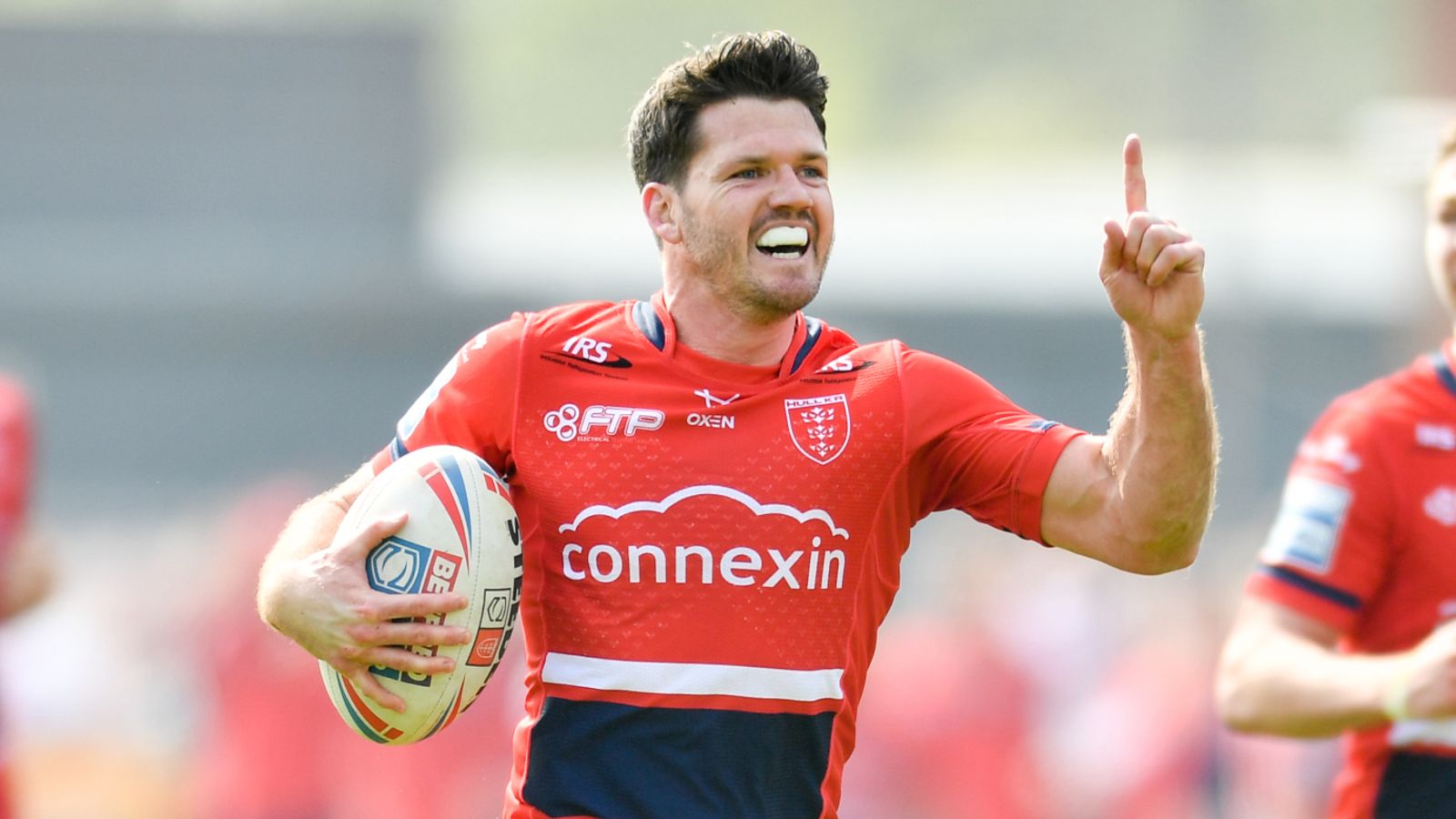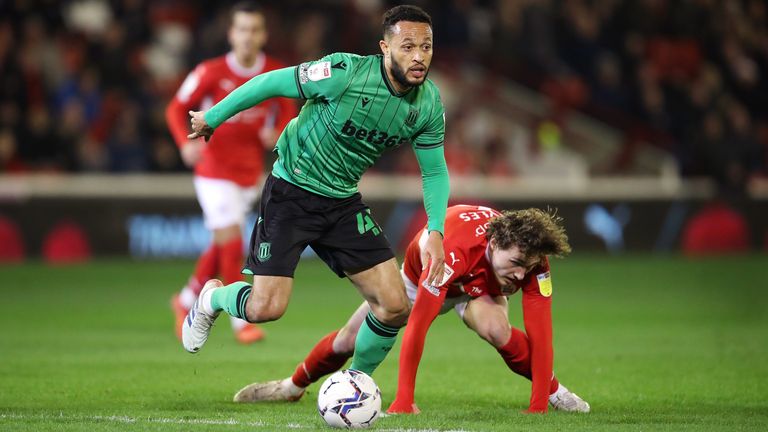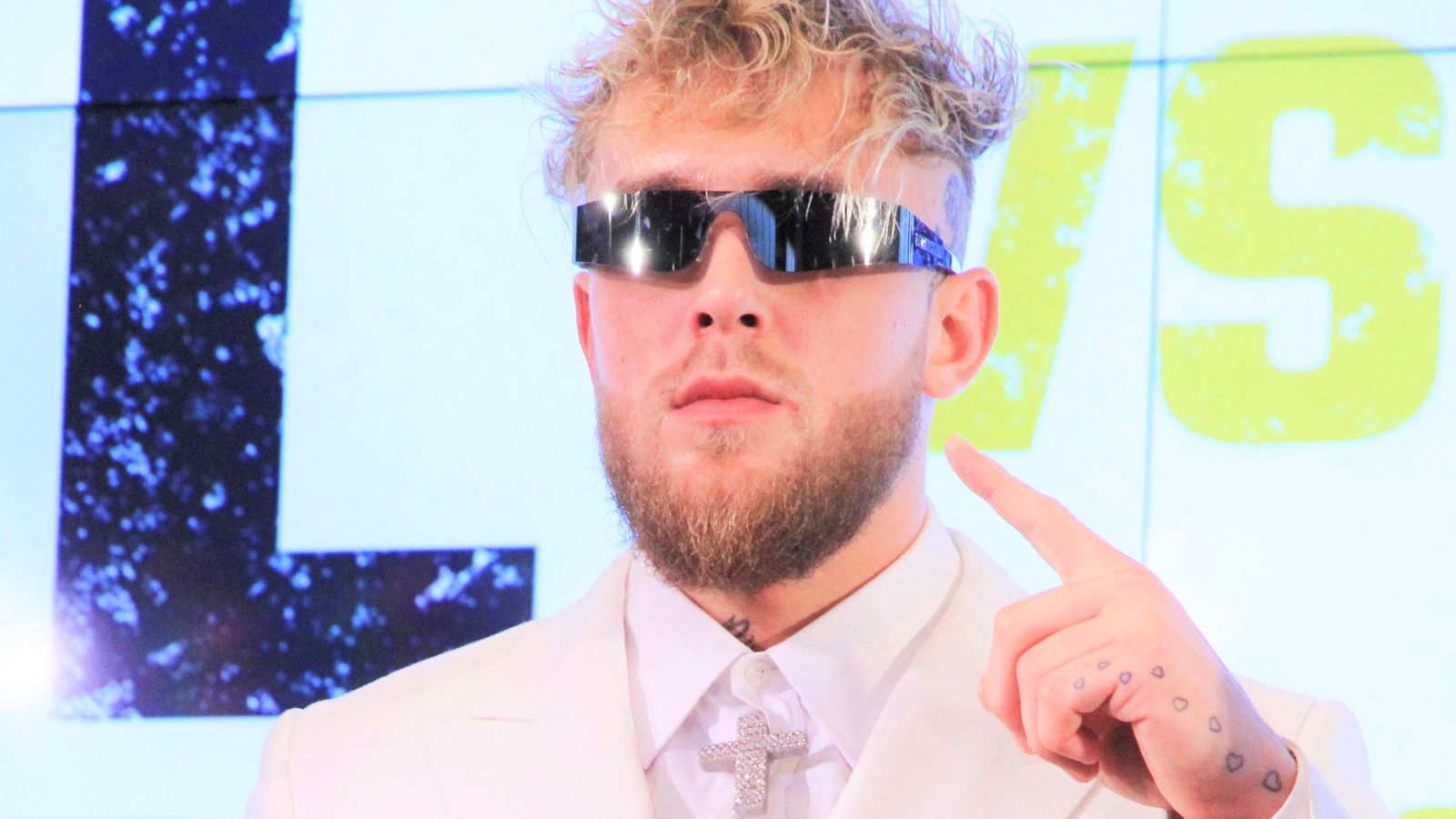Mental health in the NFL exclusive: Dr Nyaka NiiLampti on the league’s commitment to mental well-being and the humanisation of athletes | NFL News
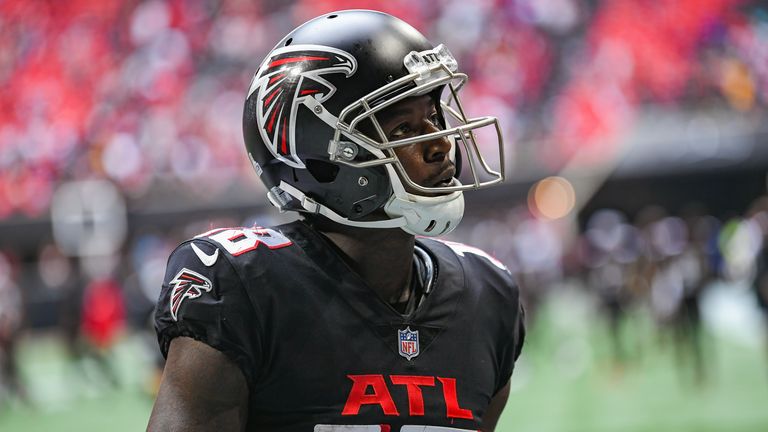
Atlanta Falcons wide receiver Calvin Ridley announced in October he was stepping away from football to focus on his mental well-being
The NFL is superseding toxic masculinity and emotion-repellent locker rooms of the past with a seat at the table for the human athlete, whose openness is testament to both individual bravery and the league’s shift towards era-defining attitudes.
Never has the sport, or sport as an entity, been in a more attentive, informed and hospitable space when it comes to the conversation surrounding mental health.
Atlanta Falcons wide receiver Calvin Ridley announced earlier this season he was stepping away from football to focus on his mental well-being; Philadelphia Eagles offensive tackle Lane Johnson took a three-game mental health break amid his long-term battle with depression and anxiety; Tennessee Titans wide receiver AJ Brown admitted publicly that he had thought about taking his own life in November 2020.
Kansas City Chiefs linebacker Willie Gay posted on social media that he was struggling with his mental health, and Dallas Cowboys quarterback Dak Prescott revealed he received help for anxiety and depression during the offseason following the death of his brother Jace.
The discussions taking place now are discussions that may have never taken place a decade ago, Dr Nyaka NiiLampti, the NFL’s Vice President of Wellness and Clinical Services, describing the progress over the last five years as “astounding”.
“I think what we’re seeing with NFL players and elite athletes across sports really speaking out about prioritising mental health and speaking out about needing to take time to build their mental health, what we like to say in sport is it’s a microcosm of society,” Dr NiiLampti told Sky Sports in an exclusive interview.
“We’ve got more and more players who are coming in from universities where they had mental health resources in their athletic departments. Athletes are coming in with already some level of mental health literacy, just the generation, so I think we’re getting to see all of those pieces now and using their platform to say ‘yeah, just like we work on building our physical health we need to make sure we’re prioritising our mental health’.”
Falcons tight end Hayden Hurst has been at the forefront of the bid to snap the stigma after creating the Hayden Hurst Family Foundation in 2018 with a view to focusing on mental health and suicide prevention, while Las Vegas Raiders defensive lineman Solomon Thomas was one of multiple players to take part in an NFL-led video series during Mental Health Awareness Month as he spoke about his own battle with depression following his sister’s death by suicide.
Players are talking, and the league is eager to listen.
“Change is really driven from the people who are saying ‘hey something needs to change’, and so in some ways I see it as the recognition of this need to shift to make this change because the players are driving it and responding to that,” said Dr NiiLampti.
“It’s the ‘okay we see the need’, players have been very clear in saying ‘this is important to us’ and then trying to figure out how do we now create an environment or culture that can be responsive to that?”
A team-mate in need of support might have suffered in silence in often blamelessly-unconscious environments of the past; the value in protecting mental well-being is not a new narrative, but one that many, perhaps by no fault of their own, are only now in the early stages of recognising and understanding.
Equally, it is the sports media’s responsibility to learn and recognise when to refrain from seeking constant updates on the status of a player such as Ridley during press conferences. Just as it is the sports media’s responsibility to learn from the case of Naomi Osaka in regards to how they treat and communicate with athletes.
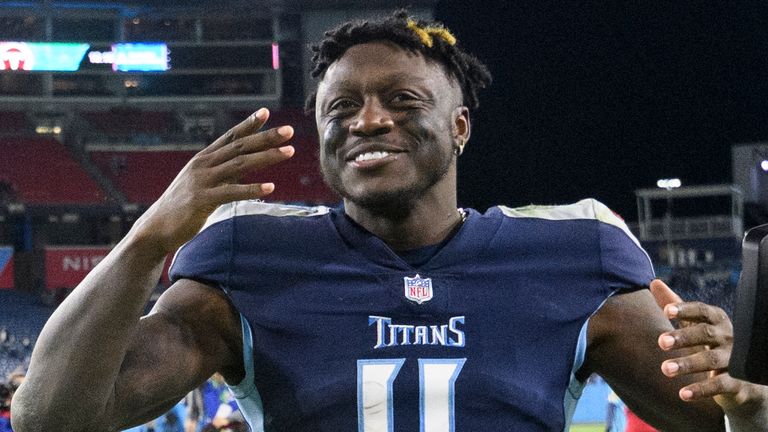
“I’m human, just like everyone else. Just because I play this beautiful game doesn’t mean that life is not going to happen to me too. I’m grateful for the person who was there for me, and I just want to encourage everyone to seek help if you’re down and you’re depressed. Just try to get help.”
Titans wide receiver AJ Brown on his battle with depression
In November, Minnesota Vikings defensive end Everson Griffen was taken to a mental health facility after local police responded to a 3am call in which he claimed somebody was in his home before later posting videos on Instagram that captured the veteran holding a gun and suggesting people were trying to kill him.
The reaction was an outpouring of support on social media from fans and players asking Griffen if he was okay and praying he received help, if help was what he needed. Concern was legitimate and acknowledgement of the circumstances a reflection of an increasingly well-versed society.
“I think for so long we have considered athletes to be superhuman, which means they’re under a spotlight, they’re under this level of scrutiny and almost this lack of recognition that they’re just like everybody else,” continued Dr NiiLampti. “They just happen to play a sport really well.
“And so what it has been, it’s been really fulfilling to watch this humanisation of athletes because I think that’s what’s happening with the conversations over the summer with (Naomi) Osaka and (Simone) Biles and Michael Phelps.
“It’s really this humanisation of this ability to say ‘listen, we appreciate the fact that we have fans and people come to see us play, and we’re also human’. I think that society is sort of starting to recognise that and support it which has been really cool to see.”
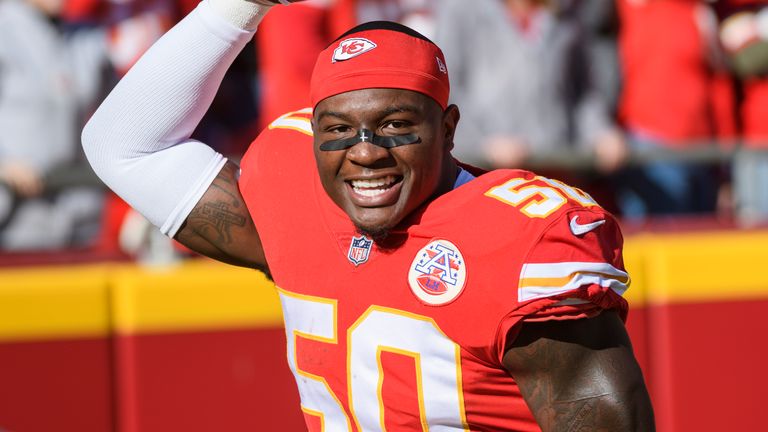
“Coming to the NFL, where people think everything’s perfect – you’ve got a little money and you play on Sundays – you just have to stay humble and let people know, ‘I’m still human at the end of the day.’ I still have feelings. I still get angry. I still get stressed. I can [make] 10 tackles and still be stressed. You’ve just got to be sure you balance it out, man.”
Chiefs’ Willie Gay after his tweet about mental health
The NFL’s gladiators shower, they eat breakfast, they sleep, they binge Netflix, they play with their kids in the park, they get told off for cursing around their elders. They are apex athletes, but they are also humans like the rest of us. And like the rest of us, they have their differences.
The dietary requirements of a 330-pound NFL offensive lineman will differ to that of a 190-pound NFL wide receiver; a pass rusher will run rip, swim and spin drills on pop-up dummies at practice while a running back works on his jump cuts; a linebacker will tackle, a quarterback will throw and a kicker will kick.
Big men stay big while fast guys stay fast, where some players throw touchdown passes others might catch them. Physical requirements vary according to job specification, as does the recovery from a torn ACL and the recovery from a dislocated shoulder, so why would the approach to mental health be the same for every player?
“I think what people are starting to appreciate now is really if we’re talking about somebody who needs mental health treatment, it is such an individualised approach, so there is no one-size-fits-all model that you can say ‘hey, this person will be back at this time’, and ‘this is what that process should look like’,” Dr NiiLampti continued.
“I think as we’re doing more and more education, that mental health literacy piece, you’re seeing more understanding of how nuanced that is and more allowances for that.”
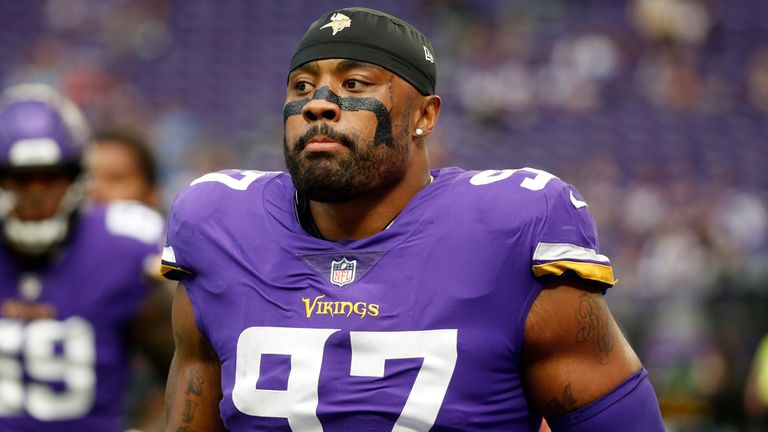
“Your mental health is always important. I think checking on your loved ones, your brothers, the tough ones that don’t show the signs of being weak, just making sure that they’re okay. That’s important in today’s world.”
Dalvin Cook on teammate Everson Griffen (pictured)
On the back of the incident involving Griffen, who later announced he has bipolar disorder, Vikings general manager Rick Spielman urged other teams and general managers around the league to put an emphasis on mental health.
In 2019, the NFL and NFLPA introduced a joint Behavioral Health Agreement that established a Mental Health and Wellness Committee while mandating team-specific Mental Health Emergency Action Plans and that all teams have a Behavioural Health Team Clinician.
NFL Life Line also offers current and former players direct contact to counsellors at any time day or night.
“If they’re in a situation where there is a mental health emergency, whether it’s a player or staff member, [it means] having a very carefully laid out protocol,” said Dr NiiLampti of the emergency action plans. “Who is contacted? How do we support them? How do we get them safe? How do we educate? What are the resources we have to tap into? How do we re-integrate them?
“All of those questions have to be answered in that mental health emergency action plan and then they’re required to rehearse it.”
Key to the NFL’s approach has been treating and teaching mental health as a constant, as opposed to a trigger that warrants a response.
Aaron Rodgers pointed towards as much when he noted how he used his time off in the spring to focus on his mental health while assuring that he was not struggling with depression or anxiety.
“The NFL has had mental health resources in place for years, for a long time,” explained Dr NiiLampti. “I think historically it’s been behind closed doors and been seen as sort of a reactionary, crisis response? So you’ve got a problem, ‘we’re going to send somebody to a clinician’.
“I think what has changed is this integration to say, just like you’ve got somebody that helps players and staff optimise their physical performance, it makes sense to have somebody who is there to help them optimise their mental performance.
“And so I think what there is a greater recognition of at this point is that prioritising mental health, which does not mean you have to have a problem, actually contributes to better performance on and off the field, for all of us.”
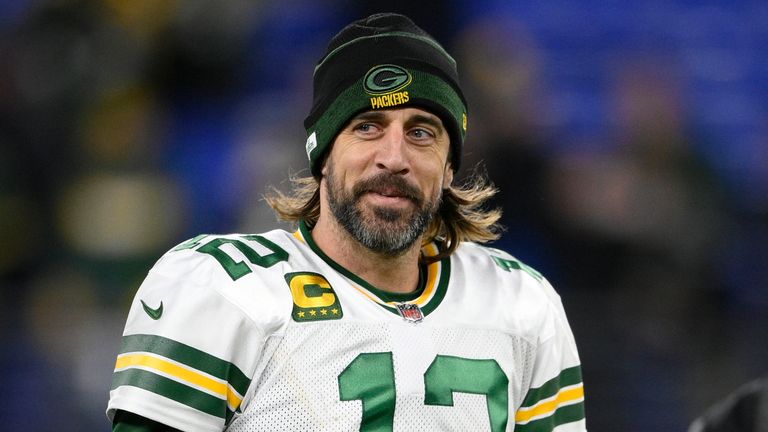
“I’m very thankful for the opportunity to work on my mental health. I haven’t dealt with bouts of depression or anything, that I think for whatever reason, are OK to talk about if you’re talking about mental health. I’ve just really been trying to think about what puts me in the best frame of mind. What habits can I form that allow me to feel most in my body, most present, happiest? And that’s what I’ve been doing.”
Rodgers on working on his mental health in the offseason
Dr NiiLampti adds that there are now six clubs with full-time clinicians, with teams translating the copycat nature of Xs and Os in the NFL into a trend of exchanging notes on methods for addressing mental health.
“There are some clubs who have been doing this for years and had really good systems and been integrated for years. What has been really fulfilling to see is some of the clubs that had not prioritised it or seen the value of it before, really starting to understand the importance and seeing some of the changes that have happened at that club level,” she said.
“I think what has also been really helpful is that, depending on the time of year, certainly pre-pandemic, providing opportunities for clubs to learn from each other.”
Besides creating a comfortable space for players to speak about mental health, an important component has been teaching others how to identify a team-mate or coach that would benefit from talking to somebody.
“So we certainly had a lot of conversations about that,” said Dr NiiLampti. “How do we make sure it’s not just ‘here are the resources you need to be taking care of’, but also ‘how to peer support each other, how can I recognise symptoms? How can I help?’.”
“The PA (Players Association) has also done a lot of work in terms of making sure players have the language they need, or have the opportunity to have some of the training that would allow them to really build some of those skills so they can really help and support each other.
“I think it’s been exciting to see just how much people have picked this up and say ‘this is something I really want to learn more about’.”
Between the complexities of mental health, the variation in the approaches players respond to and the unignorable reality that the stigma still exists in some capacity, mapping out ‘next steps’ can be difficult.
Among Dr NiiLampti’s immediate goals is to ensure all barriers are removed in order to make resources as easy to access as they can possibly be.
The emphasis being shown and the work being carried out now is designed to transfer to life beyond football, when the loss of a childhood purpose upon retirement often makes for a challenging adjustment.
“It is very much ‘how do we plant the seeds now to make that transition out easier?’, and so I think what’s been really exciting to see is we’re getting more and more young men coming in who have had mental health resources at the collegiate level,” Dr NiiLampti continued.
“And being able to continue that while they’re playing, the question is ‘how does that contribute to extended careers and being healthier?'”
The present day NFL’s commitment to mental health has the potential to be as big a part of its legacy as anything it stages on the field. Players and coaches that need to talk in 10 years’ time will thank the Ridleys and the Johnsons and the Hursts of the league for talking now.
Sky Sports NFL is your dedicated channel for NFL coverage through the season – featuring a host of NFL Network programming. Don’t forget to follow us on skysports.com/nfl, our Twitter account @SkySportsNFL & Sky Sports – on the go!


